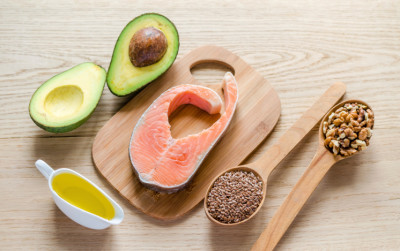Low Carb vs. Low Fat: What Diet is Right for You?
 Raise of hands: how many of you think that fats are bad for you?
Raise of hands: how many of you think that fats are bad for you?
Fat. It’s a small, one-syllable word that strikes fear in the hearts of many a dieter. Ever since low-fat diets became the latest fad, fat has largely been shunned from most weight-loss conversations. Cut the fat and you won’t be fat, right?
Hold on. It’s not that simple. Healthy fats can be important for achieving and maintaining healthy, sustainable weight loss. And, moderate amounts of saturated fat in particular may not be bad for your heart, which means restricting fat intake may not help your health or your waistline.
So, how does a low-carb diet (approximately 45 percent of calories from fat) stack up to a low-fat diet (30 percent or fewer calories from fat)?
Low Carb vs. Low Fat
Cholesterol
Many studies conducted in the 1980s revealed what was thought to be a direct correlation between the intake of saturated fats and the increase in cholesterol, which is a major indicator of heart disease. However, more recent research has shown that saturated fats don’t always cause high cholesterol and some might actually have the opposite effect.
 A recent study in the American Journal of Epidemiology compared low-fat diets and low-carb diets, and researchers concluded that “compared with participants on low-fat diets, persons on low-carbohydrate diets experienced a slightly, but statistically significant, lower reduction in total cholesterol…and a greater decrease in triglycerides.”
A recent study in the American Journal of Epidemiology compared low-fat diets and low-carb diets, and researchers concluded that “compared with participants on low-fat diets, persons on low-carbohydrate diets experienced a slightly, but statistically significant, lower reduction in total cholesterol…and a greater decrease in triglycerides.”
The low-carb group didn’t even try to avoid saturated fats, either—they had plenty of butter, meat, and cheese, and neither group was asked to count calories.
Even more surprising was that between the two groups, waist circumference, body weight, and other metabolic risks factors were not significantly different between the two diet types.
Weight Loss
When it comes to weight loss, deciding how to accomplish your goals—and make them last a lifetime—can be difficult.
The Annals of Internal Medicine published a study comparing low-carb and low-fat diets with surprising results. The researchers enrolled obese people who did not report a history of cardiovascular disease, and they were randomly assigned to a low-fat or low-carbohydrate diet.
The study found that “at three, six, and 12 months, participants on the low-carbohydrate diet had lost more weight than those on the low-fat diet. At 12 months, those in the low-carbohydrate group had lost an average of 7.7 pounds more than those in the low-fat group.”
 What Does It All Mean?
What Does It All Mean?
Saturated Fats
Chemically speaking, saturated fats are fat molecules that have no double bonds between carbon molecules because they are saturated with hydrogen molecules.
While you may think of saturated fats as coming mostly from meat and dairy products, there are also many plant-based saturated fats, including palm oil and coconut oil. Like all fats, saturated fats contain nine calories per gram.
Triglycerides
Triglycerides are fat molecules found in the blood. Individuals with high levels of triglycerides are at higher risk for atherosclerosis, which can lead to heart disease and stroke.
Share the Knowledge
If these studies surprised you, share them with your friends and family—they may be surprised too. Plus, this knowledge may help them as they create healthy meals and diet routines.
We’re proud to bring you the freshest content on the web! Follow USANA on Twitter, like our USANA Facebook page and enjoy the latest videos on the official USANA YouTube channel.
 Learn what USANA is doing to make the world a better place.
Learn what USANA is doing to make the world a better place.
The future of personalized health and nutrition is now available with USANA’s True Health Assessment.





one more study:
http://www.cell.com/cell-metabolism/abstract/S1550-4131(15)00350-2